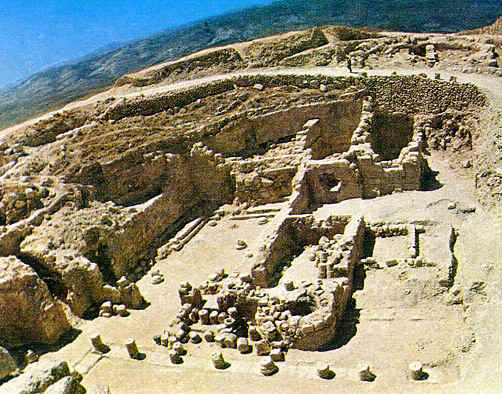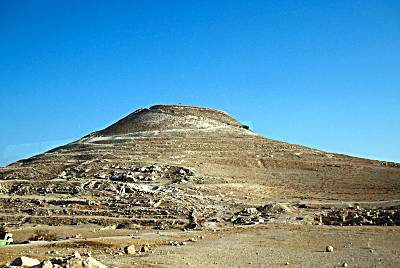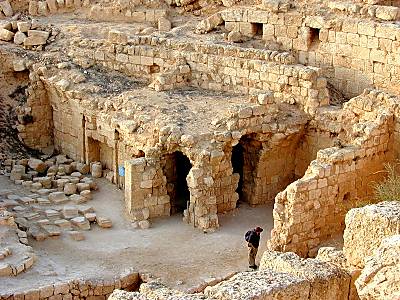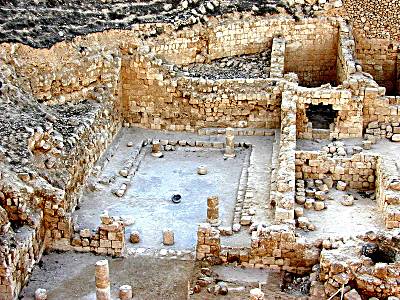
 |
Freethought & Rationalism ArchiveThe archives are read only. |
|
|||||||
|
|
Thread Tools | Search this Thread |
|
|
#1 | |
|
Veteran Member
Join Date: Jun 2010
Location: seattle, wa
Posts: 9,337
|
    Yes, I have more than a passing interest in Marcus Julius Agrippa, the last king of Israel. Agrippa is key to understand the Jewish concept of messiah given what is written in the Pentateuch: Quote:
I have already noted that Agrippa is the messiah according to the authoritative exegesis of Daniel 9:26 as well as a number of other passages. This knowledge isn't limited to Jewish writers. Origen as well as other Alexandrian Church Fathers are aware of it so it goes back almost to the time of Agrippa's death c. 100 CE. Jews and Christians continued to debate who was the real messiah - Agrippa vs. Jesus - almost into the modern period. Yet the real question that has puzzled me for decades is - where is the burial place of Agrippa? When you see the Herodium and read about its association with Herod the Great one would expect something similar for Herod's descendant Marcus Agrippa. After all, Herod may have been wealthy but Agrippa was surely richer still. Herod may have ruled for 41 years (37–4 BCE) but Agrippa's rule was even longer at about 50 years (48 - 97/98 CE?). The argument that Agrippa was a 'puppet' of the Roman government would only make it MORE likely that some massive, lasting monument would be associated with his person. There were no wars or unrest associated with the date for his death 100 CE. Agrippa had the money, means and the precedent needed to establish some gaudy memorial. So where is it? Why don't we hear anything about it anywhere? Indeed where would we expect it to be located? Despite the fact that Agrippa never had children (in itself an especially strange thing for a Jew) there were descendants of Berenice, Agrippa's sister who gained some prominence in the second and third centuries. It wasn't as if the family was wiped out. It wasn't as if Agrippa's legacy was any less than Herod the Great. Agrippa ruled in the period in which Judaism was officially wiped out. All of which makes it utterly baffling to figure out why almost all traces of Agrippa have been wiped out in Palestine (most of the inscriptions which survive are found outside Judea). Did the Jewish revolutionaries of the Bar Kochba revolt eradicate his memory? Why then wasn't the Herodium demolished? Why does the Herodium survive? It is utterly baffling and one of the most important questions and unsolved mysteries of the first century that gets far too little attention from scholarship. |
|
|
|
|
|
#2 |
|
Veteran Member
Join Date: Jun 2010
Location: seattle, wa
Posts: 9,337
|
"Agrippa never had children" - a quick side note. Have you ever wondered why Jews don't mass produce children as Catholics did (at least traditionally)? The Catholics usually point to the original 'commandment' in the Garden 'be fruitful and multiply.' Yet the rabbinic interpretation is different - fruitfulness (= the having of many children) is contingent upon whether or not it is a blessing. In other words, only be fruitful if it is a blessing. This logic is invoked in the Mishnah during the discussion of the growing asceticism in the period of Jewish revolutions (66 - 136 CE). Jews apparently became ascetics because of the Roman persecution. Yet this was also the period Agrippa was king and he had no children. Puzzling.
|
|
|
|
|
#3 | |
|
Veteran Member
Join Date: Jun 2010
Location: seattle, wa
Posts: 9,337
|
Here is what Danny Schwartz wrote about his Agrippa before the recent work at the Herodium:
Quote:
|
|
|
|
|
|
#4 | ||
|
Contributor
Join Date: Mar 2006
Location: Falls Creek, Oz.
Posts: 11,192
|
Agrippa II
Quote:
Quote:
|
||
|
|
|
|
#5 | ||||
|
Veteran Member
Join Date: Mar 2009
Location: England
Posts: 2,527
|
Quote:
Quote:
Quote:
As to where Agrippa II died - most probably at his capital of Caesarea Philippi. After the drama, or the fiasco/scandal, of his sister Berenice' affair with Titus - and her leaving Rome - It would be most unlikely for her brother, Agrippa II, to have remained in Rome. And as Agrippa II coins continued to be minted at Banias after 70 c.e. that is the most logical place for them both, Agrippa II and Queen Berenice, to have lived. Particularly since Agrippa II was still King, albeit a client king, of his territory - a territory which did not include Judea. The last king of Judea was Agrippa I - the father of Agrippa II. (and the Herodian coins support this position re father and son...) |
||||
|
|
|
|
#6 | |
|
Veteran Member
Join Date: Jun 2010
Location: seattle, wa
Posts: 9,337
|
Quote:
|
|
|
|
|
|
#7 | ||||
|
Veteran Member
Join Date: Mar 2009
Location: England
Posts: 2,527
|
Quote:
Since Agrippa II was expelled from Jerusalem prior to the events of 70 c.e., it is hardly likely that it is this King Agrippa that is finding favor in the rabbinic tradition. Agrippa II was not a king over Judea. Yes, the Agrippa history, Agrippa I and Agrippa II is indeed puzzling - but I fail to see how rejecting the Herodian coins with their testimony to two Kings by the name of Agrippa - is going to be offering anything at all in the way of resolving the questions around these two kings. Schwartz does not support the one Agrippa story. He says the rabbinic tradition is problematic. He asks questions: Quote:
Page 36 of the book by John Wilson - link in earlier post. Quote:
|
||||
|
|
|
|
#8 |
|
Veteran Member
Join Date: Jun 2010
Location: seattle, wa
Posts: 9,337
|
I have spoken with Wilson on a number of occasions. His point here is most perplexing as the “rabbinic tradition” didn't exist when the coin was minted. The understanding may have been rooted in Phariseeism but Agrippa wouldn't have given a hoot about what they had to say. They didn't represent normative belief in any way at that time. So what's his point? That a ruler offended the sensibilities of the rabble? Wow, who'd believe that. If anything that shows that (a) his worldview was compatible with Christianity and (b) that he wasn't such a weak ruler after all.
|
|
|
|
|
#9 | |
|
Veteran Member
Join Date: Mar 2009
Location: England
Posts: 2,527
|
Quote:

|
|
|
|
|
|
#10 |
|
Veteran Member
Join Date: Jun 2010
Location: seattle, wa
Posts: 9,337
|
His people were annoying back then. The Romans won the war and offered the world a better civilization than the kind of theocracy being advocated by the Pharisees. The closest modern example to what the Pharisees embodied was the rabid theocracy of Iran or the Muslim Brotherhood. This is not my idea of an 'ideal society' by any means.
You can understand Agrippa's sentiment. Jews were typically accused in those days of 'hatred of the human race' which is a roundabout way of saying they thought they were better than everyone else. The small matter being of course that they were a subjugated people. This must have puzzled and annoyed the Romans and Agrippa for that matter too (as their unbridled hubris affected his status as their ruler). Agrippa was superior to his subjects. Anyone who argues with this is a hypocrite. He was the perfect embodiment of the messiah and was recognized as such by Jews until the modern era. He is recognized for his authority in Jewish religious matters as well as Greek philosophy. He was the embodiment of the philosopher king. IMO he felt himself called to the role of improving his subjects because they were for the most part a bunch of idiots. As you know I think that we have Christianity today as the fruits of his labors to improve his subjects. Let's not forget this used to be the core doctrine of Christianity (i.e. the repentance of Jews and still is the Orthodox tradition). Placed in its original historical context - i.e. the superiority of Alexandrian Judaism (and Samaritanism for that matter cf. Broadie's work) over its Palestinian Jewish cousin - such a doctrine makes sense. I firmly believe Philo is superior to every Jewish authority in terms of his depth, profundity, insight etc. I don't think anyone, save for rabid Jewish believers, could think otherwise. Plato improved Judaism. This is the original formula for Christianity and Agrippa was its architect |
|
|
| Thread Tools | Search this Thread |
|